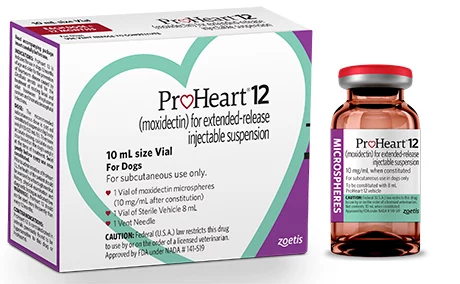ProHeart injections are used to prevent dogs from heartworm disease. Heartworm disease is very fatal and it causes organ damage to dogs. If your dog received a ProHeart injection but he developed adverse side effects and eventually lost his life, it must be a heart-wrenching moment for you and I am much sorry for your loss.
This article will make you understand more about ProHeart injection and what could have contributed to the regrettable loss and how it can be prevented in the future.
Reasons ProHeart Injection Killed My Dog

Below are some of the reasons why a dog can die after getting a ProHeart injection;
Overdose
One of the main reasons why ProHeart can cause death is overdosing. If the dosage is too high, it may result in fatal adverse effects. Always make sure to abide by the directions and dosages that your veterinarian has provided.
Allergic Reaction
Your dog might have had an allergic reaction to ProHeart leading to his death. Some dogs have allergies to the medication’s ingredients, which might cause anaphylaxis, which can be fatal if not treated immediately.
Interaction With Other Mediations
If ProHeart was administered while your dog was taking other medication, it can lead to fatal results. Always inform your vet of any drugs your dog is taking to prevent drug interaction.
Previously Existing Conditions
ProHeart should not be administered to dogs with pre-existing medical issues such as liver or kidney illness, heart disease, or anemia. If your dog had any of these diseases and received a ProHeart infection, adverse side effects like death can occur.
Injection Site
Sometimes, the injection site can develop an infection or a huge, uncomfortable lump, which can cause complications and even death. Always keep an eye on the injection site on your dog, and notify your physician immediately if anything seems abnormal.
What Is ProHeart (Moxidectin)?
ProHeart is an injectable parasiticide used in dogs six months of age and older to treat and control intestinal parasites including hookworms and roundworms as well as prevent heartworm disease brought on by Dirofilaria immitis.
ProHeart 6 offers dog heartworm disease prevention for six months, while ProHeart 12 offers heartworm disease prevention for a full year. ProHeart 6 should be administered to dogs that are at least 6 months old but under 1 year old.
The ProHeart 12 (yearly) injection was just recently approved by the US Food & Drug Administration (FDA) on July 2, 2019, unlike the ProHeart 6 (six-month) injection, which has been approved and available since 2008.
How Does ProHeart Work?
The slow-dissolving microspheres containing the active component, moxidectin, are kept in your dog’s connective tissue that stores fat (also known as adipose tissue). The medication is then gradually released over a period continuously protecting your dog from heartworms. Long-term testing has shown that this is safe and beneficial.
Although ProHeart kills parasites by affecting their nervous systems, it is not toxic to your dog.
Is ProHeart 12 Safe?
Investigators tested ProHeart 12’s safety in lab and field experiments with client-owned dogs before the FDA’s approval.
In 2004, ProHeart 6 underwent a voluntary recall; tests from the FDA suggest that the problem was caused by some allergic residual solvents used in manufacturing, which led to adverse reactions in dogs. This made the company change the way the medicine was made.
Since then, extensive safety and efficacy studies have been conducted, and it has been approved and rereleased. Since the reintroduction, Zoetis, the current manufacturer, claims that adverse reactions are uncommon but normally not serious.
The only negative effects of ProHeart 12 from clinical trials were nausea, fatigue, diarrhea, anorexia, and hypersensitivity reactions.
It is also important to note that there have been no recalls or safety issues with ProHeart injections since they were approved for use in Canada, the European Union (France, Greece, Italy, Portugal, Spain), Korea, and Japan.
ProHeart 12 has also been certified and used in Australia since 2000.
How long will ProHeart 6/12 remain in the body?
Numerous studies have revealed that the amount of ProHeart 6/12 in the body at the end of the six- or twelve-month treatment period is too small to measure. Further research showed that there was no ProHeart 6/12 buildup over time following four consecutive treatments.
Evidence of Efficacy for Moxidectin
Heartworm Disease Prevention
Dogs were infected with infectious larvae 365 days after receiving a dose of 0.5 mg/kg of an injectable moxidectin microsphere formulation (ProHeart 12; Zoetis, zoetisus.com), and it was demonstrated that this formulation was 100% successful in preventing the development of D immitis.
Intestinal Parasites
Roundworms (adult Toxocara canis and adult T leonina) and hookworms (L4, immature adult, adult A caninum, and adult U stenocephala) can both be treated with moxidectin products with high degrees of success.
ProHeart Side Effects
A dog can have severe allergic reactions like hives, vomiting, breathing problems, and collapse. Some extremely severe allergic reactions can be emergencies requiring prompt veterinary care. The first hour following treatment is when symptoms of a severe allergic reaction are most common, but they can appear at any point in the first 24 hours. For 24 hours following ProHeart treatment, keep a close eye out for any of these symptoms in your dog as they could be a sign of a severe allergic reaction.
Other side effects include;
- Lethargy
- Fever
- Loss of appetite
- Vomiting
- Diarrhea
- Pale gums
- Increased thirst or urination, weakness, bleeding, bruising
Can ProHeart 6 or 12 be given with other medicines?
ProHeart 6 and ProHeart 12 have been used safely in dogs receiving other veterinary medications like anthelmintics, anti parasiticides, antibiotics, analgesics, steroids, non-steroidal anti-inflammatory drugs (NSAIDs), anesthetics, and flea control products in well-controlled clinical studies. When ProHeart 6/12 and vaccines are administered at the same time, allergic responses, sometimes severe, have been reported. Discuss the dangers of giving ProHeart 6/12 together with vaccines with your veterinarian. Inform your vet of all medications you have given your dog in the past as well as those you intend to use with ProHeart 6/12.
How Long Do ProHeart Side Effects Last?
Depending on the particular dog and the severity of its symptoms, ProHeart side effects will vary. Mild side effects like vomiting or diarrhea will typically go away in a few days. However, more severe reactions like anaphylactic shock can be fatal and might necessitate immediate medical care.
Can ProHeart be used in all dogs?
ProHeart is discouraged for use in puppies younger than six months of age, dogs with known hypersensitivity to ProHeart or any of its constituents, or dogs with a history of immune-mediated diseases. Before administering ProHeart to your dog, it’s crucial to go over their medical history with your veterinarian.
Is ProHeart safe for all breeds of dogs?
According to studies, most dog breeds can use ProHeart without any adverse effects. However, some breeds, such as collies and other herding breeds, might be more sensitive to the medication than others. Before introducing ProHeart to your dog, it’s crucial to discuss the breed and medical background of the dog.
ProHeart Drug Interactions
ProHeart 6 and ProHeart 12 should not be administered with immunizations due to the possibility of immune-mediated responses and anaphylaxis.
Moxidectin should be administered with caution when P-gp substrates are being administered to canine patients. In breeds at risk for the ABCB1 gene mutation, the use of these medications concurrently with moxidectin should be avoided unless the breed has been proven to be negative for the gene mutation. Although not a complete list, the following medications should be used with caution
- Amiodarone
- Clarithromycin
- Cyclosporine
- Itraconazole
- Ketoconazole
- Loperamide
- Spinosad
- Spironolactone
Which dogs should not be treated with ProHeart 6/12?
Using ProHeart 6 on sick, weak, or underweight animals is not advised. In dogs with a history of allergic illness, such as prior vaccine reactions, food allergies, atopy, or flea allergy dermatitis, ProHeart 6 should be administered with caution. Before using ProHeart 6 to treat heartworm disease in dogs, a heartworm test should be performed. If a test for adult heartworms in your dog is positive, your veterinarian should first treat the infection with the proper medicine before giving ProHeart 6.
How to Treat and Prevent Dog Heartworm Disease
Thankfully, there are lots of preventative measures and treatment options that don’t involve getting an injection every year! For example, puppies that don’t qualify for ProHeart 12 or ProHeart 6 can take heartworm prevention and treatment tablets.
Melarsomine, a series of injections given to adult dogs with heartworm disease, is another helpful option. Heartworms are killed by the shots without harming your dog.
Your dog will require a lot of rest and fluids after receiving this medication. Their bodies will use energy to repair the harm the heartworms cause.
Symptoms of Dog Heartworm Disease
Even though your veterinarian will need to take samples of your dog’s stools to determine what type of heartworm is harming them, there are obvious indicators that show your dog has heartworm disease, typically, the symptoms don’t appear until a week after transmission.
The following symptoms in your dog could be an indication they have heartworm disease, so keep an eye out for them:
- Rapid weight loss
- Lethargy
- Mood swings
- Exhaustion
- Sleepiness
- Anxiety
Is Heartworm Injection Necessary?
Heartworm injections are a relatively new method of heartworm prevention. Every six to twelve months, an injection is given to protect against heartworms.
Injections are more efficient than a monthly pill or topical medication. However, they are not entirely successful. The main benefit of this injection is that pet owners won’t have to remember to give their animals a tablet or a topical every month.
Given that there are some potential adverse effects, you should talk to your veterinarian about whether the injection is appropriate for your pet.
Heartworm disease is a fatal disease in dogs. Pets become affected when mosquitoes that contain heartworm larvae bite them. After being injected into an animal, the larvae develop into adult worms that reside in the heart and lungs.
As they develop, they may harm vital organs like the heart and lungs, which may result in death. Many people choose to use heartworm medication as a preventative measure as opposed to treatment.
FAQs
Can ProHeart cause liver or kidney damage in dogs?
It has been proved that ProHeart is safe for usage in dogs with healthy liver and renal function. However, ProHeart side effects may be more likely to affect dogs who already have liver or kidney disease. Before giving your dog ProHeart, it’s crucial to go through its medical history with your veterinarian.
Can ProHeart cause anemia in dogs?
Rarely, ProHeart has been linked to anemia. Some of the symptoms of anemia include Pale gums, weakness, and lethargy. After giving your dog ProHeart, if you observe these symptoms in your dog, contact your veterinarian for guidance.
Are there any alternatives to ProHeart for preventing heartworm disease in dogs?
Yes, many more drugs can be used to prevent heartworm disease in dogs. These drugs include chewable tablets, topical treatments, and injectable drugs. Based on your dog’s medical history and lifestyle, your veterinarian can assist you in selecting the option that is best for them.
Can my dog still get heartworm disease if they are on Proheart?
Although Proheart is very effective at preventing heartworm disease, your dog could still contract heartworms. For this reason, it’s crucial to maintain frequent examinations and testing to make sure your dog stays healthy.
Can ProHeart cause behavioral changes in dogs?
ProHeart has been linked, though rarely, to changes in behavior in some dogs. Lethargy, depression, and alterations in appetite are only a few examples of these changes. After giving your dog ProHeart, if you detect any behavioral changes, speak with your veterinarian for assistance.
ProHeart 12 vs. Heartgard: Which is Better?
Another drug used to protect dogs from developing heartworm illness is Heartgard. Heartgard and ProHeart 12 both successfully prevent heartworm, although they do so in different ways. Heartgard is a chewable tablet that is administered monthly, whereas ProHeart is an injectable that is administered every 12 months. Your dog’s specific demands and the advice of your veterinarian may influence your decision between the two treatments.


My vet gave my dog a second dose of pro heart 6 accidentally only 60 days after the first dose. She is 11 years old weighing about 36 pounds. I took her to the vet as she has what feels like, a fluid pocket near her front left leg on her chest area. They are so busy trying to downplay it that I don’t think they are taking this seriously. I am going to a different vet tomorrow to see if I can get an unbiased opinion and tests done. Any recommendations on the tests to requests and what this fluid pocket could be?